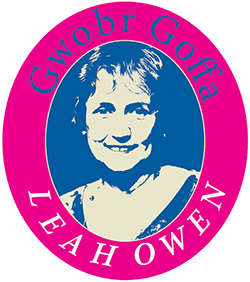(Cymraeg) Cyflwyniad Dr. Huw Griffiths – “Hanes Cymru – yr angen i ddysgu ein stori.”
Reply

 Cyflwyna Dyfodol i’r Iaith gystadleuaeth Gwobr Goffa Leah, gwobr er cof am Leah Owen a’i chyfraniad aruthrol at ddiwylliant Cymru. Bu Leah’n weithredol dros y Gymraeg o ddyddiau cynnar ei hymgyrchu a’i chanu trwy flynyddoedd y cyfansoddi a hyfforddi ei chorau a channoedd o bobl ifanc.
Cyflwyna Dyfodol i’r Iaith gystadleuaeth Gwobr Goffa Leah, gwobr er cof am Leah Owen a’i chyfraniad aruthrol at ddiwylliant Cymru. Bu Leah’n weithredol dros y Gymraeg o ddyddiau cynnar ei hymgyrchu a’i chanu trwy flynyddoedd y cyfansoddi a hyfforddi ei chorau a channoedd o bobl ifanc.
Mae’r ddwy gystadleuaeth, sef creu fideo ar destun penodol, yn agored i ddisgyblion Ysgol Uwchradd Blwyddyn 10-11 ac i rai Blwyddyn 12-13 a myfyrwyr Colegau Addysg Bellach (hyd at 19 oed).
Mwy o wybodaeth yma: Gwobr Goffa Leah Owen
Dylid anfon dolen gyswllt at y fideo, ynghyd â chopi o’r ffurflen ganiatâd, drwy’r ysgol (nid y disgybl/myfyriwr unigol) at yr e-bost canlynol: [email protected]